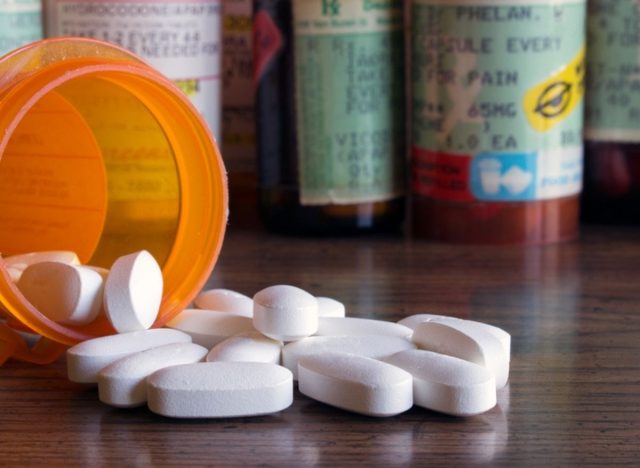Ugly Side Effects of Drinking a Glass of Wine Every Day, According to Science

While you’ve probably heard that there are health benefits to drinking red wine, such as lowering cholesterol, managing diabetes, and reducing inflammation, a heavy wine habit can actually have some nasty side effects, like an increased risk of cancer or heart disease. But if “heavy” drinking leads to these side effects, what does just one glass of wine a day do?
“You don’t need to drink every day, and less is probably best,” explains Lisa R. Young, Ph.D., RDN, a member of our Medical Expert Board. “But if you do drink, the [current] Dietary Guidelines advise one drink a day for women and two drinks for men.”
However, consuming wine at this lower level isn’t right for everyone, and you should be aware of the potential drawbacks of even light drinking. Because although just one glass a night with dinner may not sound harmful at all, it can come with some potential health complications. Before you pour another glass, read on to discover the side effects of regularly drinking just one glass of wine each night and how they impact your overall health. Also, for more insight into how certain types of wine may potentially affect your body, be sure to read 5 Side Effects of Drinking White Wine Every Night.
Drinking wine may disrupt your sleep

One side effect of drinking wine—or any alcohol, for that matter—in the evening is that it may disrupt your sleep. Even though people often feel sleepy or more drowsy after drinking, this feeling doesn’t last. Instead, according to Handbook of Clinical Neurology, alcohol can reduce how long a person is in their REM cycle and cause sleep disruptions throughout the night. So, even if you think that a glass of wine is going to lull you to sleep quicker and more peacefully, you’ll be disappointed to know that it may also wake you up in the middle of the night.
Wine can impact your medication

Alcohol interacts in potentially dangerous ways with many medications, including acetaminophen, antidepressants, anticonvulsants, painkillers, and sedatives, according to the National Institute on Alcohol Abuse and Alcoholism. If you mix alcohol with certain medications, it may lead to drowsiness, headaches, nausea, or in some cases, fainting. It can also render antibiotics useless, so be sure to read warnings on all medication before enjoying your nightly glass of wine.
It can increase your breast cancer risk

Your daily wine habit may be increasing your risk of breast cancer, even if it’s only moderate consumption. According to a review published in Breast Cancer Research, while heavy drinking (50 grams of alcohol per day or more) was found to contribute to a higher risk, even just 18 grams of alcohol a day had effects on this increase as well. To put it in perspective, one drink is approximately 14 grams of alcohol, so your daily glass may have more significant impacts on your health than you realize.
Another review of 53 epidemiological studies concluded that for women, every 10 grams of alcohol added per day—less than one drink—led to a corresponding 7% increase in the risk of breast cancer for those who didn’t smoke tobacco.
It can also increase your overall cancer risk

If you think you’re in the clear because you don’t smoke tobacco but still partake in drinking alcohol, you may be disappointed to find out that light to moderate alcohol consumption can increase cancer risk.
According to a 2019 research article, drinking a bottle of wine a week—far less than a glass a day—increases a person’s lifetime cancer risk by around 1%–1.4%.
It can lead to an accelerated and/or irregular heartbeat

Frequently drinking alcohol, even in small amounts, can up your risk of an abnormally fast heartbeat. A study published in EP Europace found that those who drank alcohol every day had the highest risk when compared to those who drank alcohol once or twice a week. What is interesting about these findings is that when it comes atrial fibrillation (aka an irregular heartbeat), researchers discovered that the frequency may matter more so than the amount of alcohol itself. In fact, those who had larger amounts of alcohol in one sitting had a lower risk of AF than those who drank low but frequent amounts throughout the week.
These findings aren’t to encourage repeated binge drinking, though. The CDC warns that binge drinking—which is considered more than four drinks in one session for women and five for men—can contribute to heart disease, mental health issues, dementia, and cancer.
It can elevate your blood pressure

“Moderate drinking—one glass a day for women and two a day for men—is generally considered okay for heart health, but higher consumption of alcohol may increase a person’s risk for hypertension,” says Young. Hypertension, also known as high blood pressure, can lead to heart failure and kidney disease.
According to the Mayo Clinic, three or more drinks in one evening might temporarily raise your blood pressure levels, with “repeated binge drinking” causing blood pressure levels to remain raised for longer.
It may lead to other cardiovascular complications, including heart disease

The World Heart Federation (WHF) recently released a policy brief stating that “no amount of alcohol is good for the heart.” The brief adds that drinking alcohol has been linked to a slew of diseases like an increased risk of cardiovascular disease, coronary disease, stroke, heart failure, hypertensive heart disease, cardiomyopathy, atrial fibrillation, and aneurysm. They say that these risks increase with 100 grams of alcohol per week—about seven drinks—compared to those who consume between zero and 25 grams, or about zero to two drinks.
However, according to coverage by CNN, this WHF received a lot of criticism for releasing this report with such a black-and-white stance on alcohol consumption, and many people still stand behind the idea that lighter drinking may be able to help your heart.
“There are some scientific studies that support their headline, but based on my work on the Global Burden of Disease Study, which pulls together all the available evidence to date, the claim by the WHF is not supported by the scientific evidence currently available,” Emmanuela Gakidou, a professor at the University of Washington’s Institute for Health Metrics, reportedly told CNN.
What this pushback ultimately means is that the overall heart health implications of alcohol consumption are still widely debated, and you may want to consider discussing your personal drinking habits with your doctor to see what’s best for you.
It can take a toll on your liver

The liver makes metabolic enzymes that digest and break up toxins like alcohol, so daily alcohol consumption requires extra work from the liver, according to the Mayo Clinic. Daily drinking over time may cause fibrosis or scarring of the liver tissue, or it can lead to alcoholic hepatitis, which is an inflammation of the liver.
A study from February 2022 discovered that one of the main ways alcohol can impact the liver is by way of the mitochondria. According to a news piece about the article from Cedars-Sinai, the liver is very rich in mitochondria, but alcohol has been known to interfere with the mitochondria’s functioning, which can ultimately result in liver injury.
Your immune system can take a hit

Daily drinking may impact your immune system and can make you more susceptible to infections, which means you might notice that you catch colds, flu, or other illnesses more frequently if you partake on a regular basis.
According to a report published in Alcohol Research, alcohol can impact the health of your gut microbiome because your GI tract is the first place alcohol goes, meaning it immediately starts to “alter the integrity” of your GI tract. For instance, alcohol naturally changes up the microbes found in your gut microbiome, which in turn actually disrupts the communication between your gut and immune system. Drinking on a consistent basis can lead to more of these challenges over time and may result in a weakened immune system.
Wine type makes no difference in terms of possible side effects

After all of this information, you may be asking yourself if there’s a difference between drinking red or white wine, especially because people often talk about red being healthier.
“Red wine is often considered to be better for you because of the high levels of resveratrol,” says Young, “But you can also get this from red grapes. It’s the quantity that really matters more.”
If you’re focusing on sugar, white wine often contains a little more. However, you’ll still be consuming sugar with both red and white, so there isn’t an enormous difference there. As Young points out, when it comes to drinking wine, how often and how much you’re drinking matters far more than whether it’s red or white.
A previous version of this story was published on March 9, 2022. It has been updated to include additional copy and proofreading revisions, additional research, updated imagery, and updated contextual links.
- Source: https://www.dietaryguidelines.gov/
- Source: https://www.sciencedirect.com/science/article/abs/pii/B9780444626196000240?via%3Dihub
- Source: https://www.niaaa.nih.gov/publications/brochures-and-fact-sheets/harmful-interactions-mixing-alcohol-with-medicines
- Source: https://breast-cancer-research.biomedcentral.com/articles/10.1186/bcr2422
- Source: https://www.niaaa.nih.gov/alcohols-effects-health/overview-alcohol-consumption/what-standard-drink
- Source: https://www.nature.com/articles/6600596
- Source: https://bmcpublichealth.biomedcentral.com/articles/10.1186/s12889-019-6576-9
- Source: https://academic.oup.com/europace/article/22/2/216/5587889
- Source: https://www.cdc.gov/drinklessbeyourbest/excessivedrinking.html#:~:text=Long%2DTerm%20Health%20Effects,Weakened%20immune%20system
- Source: https://www.mayoclinic.org/diseases-conditions/high-blood-pressure/expert-answers/blood-pressure/faq-20058254#:~:text=Drinking%20too%20much%20alcohol%20can,term%20increases%20in%20blood%20pressure.
- Source: https://world-heart-federation.org/
- Source: https://world-heart-federation.org/wp-content/uploads/WHF-Policy-Brief-Alcohol.pdf
- Source: https://www.healthdata.org/gbd/2019
- Source: https://www.mayoclinichealthsystem.org/hometown-health/speaking-of-health/effects-of-alcohol-on-your-health-and-liver#mainWrapper
- Source: https://www.mayoclinic.org/diseases-conditions/alcoholic-hepatitis/symptoms-causes/syc-20351388
- Source: https://www.ncbi.nlm.nih.gov/pmc/articles/PMC4590612/








